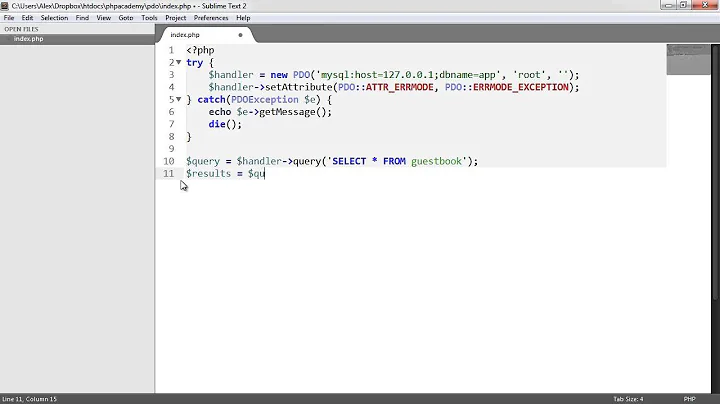PDO::fetchAll vs. PDO::fetch in a loop
Solution 1
Little benchmark with 200k random records. As expected, the fetchAll method is faster but require more memory.
Result :
fetchAll : 0.35965991020203s, 100249408b
fetch : 0.39197015762329s, 440b
The benchmark code used :
<?php
// First benchmark : speed
$dbh = new PDO('mysql:dbname=testage;dbhost=localhost', 'root', '');
$dbh->setAttribute(PDO::ATTR_ERRMODE, PDO::ERRMODE_EXCEPTION);
$sql = 'SELECT * FROM test_table WHERE 1';
$stmt = $dbh->query($sql);
$data = array();
$start_all = microtime(true);
$data = $stmt->fetchAll();
$end_all = microtime(true);
$stmt = $dbh->query($sql);
$data = array();
$start_one = microtime(true);
while($data = $stmt->fetch()){}
$end_one = microtime(true);
// Second benchmark : memory usage
$stmt = $dbh->query($sql);
$data = array();
$memory_start_all = memory_get_usage();
$data = $stmt->fetchAll();
$memory_end_all = memory_get_usage();
$stmt = $dbh->query($sql);
$data = array();
$memory_end_one = 0;
$memory_start_one = memory_get_usage();
while($data = $stmt->fetch()){
$memory_end_one = max($memory_end_one, memory_get_usage());
}
echo 'Result : <br/>
fetchAll : ' . ($end_all - $start_all) . 's, ' . ($memory_end_all - $memory_start_all) . 'b<br/>
fetch : ' . ($end_one - $start_one) . 's, ' . ($memory_end_one - $memory_start_one) . 'b<br/>';
Solution 2
One thing about PHP that I've found to be true almost always is that a function you implement yourself will almost always be slower than the PHP equivalent. This is because when something is implemented in PHP it doesn't have all the compile time optimizations that C has (which PHP is written in) and there is high overhead of PHP function calls.
Solution 3
all benchmarks above which measure "memory footprint" are actually incorrect for the very simple reason.
PDO by default does load all the things into the memory and it does not care if you use fetch or fetchAll. To really get benefits of unbuffered query you should instruct PDO to use unbuffered queries:
$db->setAttribute(PDO::MYSQL_ATTR_USE_BUFFERED_QUERY, false);
In that case you will see huge difference in memory footprint of the script
Solution 4
@Arkh
// $data in this case is an array of rows;
$data = $stmt->fetchAll();
// $data in this case is just one row after each loop;
while($data = $stmt->fetch()){}
// Try using
$i = 0;
while($data[$i++] = $stmt->fetch()){}
The memory difference should become neglijable
Solution 5
As Mihai Stancu was saying, there is almost no memory difference though fetchAll beats fetch + while.
Result :
fetchAll : 0.160676956177s, 118539304b
fetch : 0.121752023697s, 118544392b
I got the results above with running while correctly:
$i = 0;
while($data[$i++] = $stmt->fetch()){
//
}
So the fetchAll consumes less memory, but fetch + while is faster! :)
Related videos on Youtube
Lotus Notes
Updated on July 05, 2022Comments
-
Lotus Notes almost 2 years
Just a quick question.
Is there any performance difference between using PDO::fetchAll() and PDO::fetch() in a loop (for large result sets)?
I'm fetching into objects of a user-defined class, if that makes any difference.
My initial uneducated assumption was that fetchAll might be faster because PDO can perform multiple operations in one statement while mysql_query can only execute one. However I have little knowledge of PDO's inner workings and the documentation doesn't say anything about this, and whether or not fetchAll() is simply a PHP-side loop dumped into an array.
Any help?
-
 Timothy about 14 yearsI don't know, but I suspect it would be trivial to benchmark.
Timothy about 14 yearsI don't know, but I suspect it would be trivial to benchmark.
-
-
Reece45 about 14 yearsThere are times where its worth it not to use the PHP-builtin. Such as searching a sorted array (binary search ftw).
-
Lotus Notes about 14 yearsI'm not sure I quite understand your answer, but I do have to do a couple operations on all the objects again after they are fetched which would undoubtedly require another foreach loop. Should I just stick with fetching one object at a time and performing the operations on each object as it is fetched?
-
Kendall Hopkins about 14 years@AlReece45 You described two completely different functions. I was talking about reimplementing the sort function in PHP vs using PHP's
sort. @Byron I'm betting you'll find that fetching all the results using fetchAll() will still be faster, but you could benchmark it withmicrotime(TRUE)if you have doubts. -
Joost over 13 yearsFaster? 0.16 (
fetchAll) vs. 0.12 (fetch) -
 Arkh over 13 yearsYeah you don't. It's the goal of the benchmark : first one is you do a fetchAll THEN do the work on the data. Second one, you would fetch one row, do the work on this row, then fetching the next row. A good example would be when displaying a data table, do you need to store ALL your data before writing in the buffer or not ?
Arkh over 13 yearsYeah you don't. It's the goal of the benchmark : first one is you do a fetchAll THEN do the work on the data. Second one, you would fetch one row, do the work on this row, then fetching the next row. A good example would be when displaying a data table, do you need to store ALL your data before writing in the buffer or not ? -
mpen almost 11 years@Reece45 Binary search is logarithmic; it should be fast whether it's written in C or PHP. Sorting OTOH is
O(n log n)-- there's a bit more savings to be had. -
Kendall Hopkins almost 11 yearsOn a theory level it might make sense to implement binary search in PHP, but unless your N is very large (which most of the time isn't true unless your doing something wrong), it's better to just use the O(N) which PHP provides.
-
 Populus about 10 yearsSorry for necroing, I don't get why people would say this is a bad benchmark. There is no reason to store the entire data set unless you're return that data to a user... which is just plain bad in the first place, use paging in that case. If you need to modify data on a database en masse, you should do this within the database either with a script, or a stored procedure, e.g. temp tables.
Populus about 10 yearsSorry for necroing, I don't get why people would say this is a bad benchmark. There is no reason to store the entire data set unless you're return that data to a user... which is just plain bad in the first place, use paging in that case. If you need to modify data on a database en masse, you should do this within the database either with a script, or a stored procedure, e.g. temp tables. -
DavidScherer about 10 yearsWith significantly larger result sets, you would see a significant difference between PDOStatement::fetch() and PDOStatement::fetchALL(). Determining what qualifies as "Significantly Larger" would be dependent on the size of each row. Additionally, by default, PDOStatement::Fetch()/fetchAll() uses the fetch mode PDO::FETCH_BOTH which effectively doubles the size of each row, changing this can help mitigate MEM usage on large result sets.
-
DavidScherer about 10 yearsAlso, the down vote was for not providing any reference statistics for your benchmark, making it inherently flawed. The various pieces of overhead with PHP functions and what not would account for the MEM difference.
-
DavidScherer about 10 years@stancu the top and bottom variants are effectively identical, and the additional MEM seen using fetch() is likely an artifact of overhead of the while(). The point of fetch() is to process a row at a time, using while() to accomplish the same thing as fetchAll(PDO::FETCH_NUM) is silly, as you loose out on C-level compiler optimizations taking place in the PDO module.
-
 bwoebi almost 9 years-1. This is definitely a bad benchmark. The memory is not the real memory.
bwoebi almost 9 years-1. This is definitely a bad benchmark. The memory is not the real memory.memory_get_usage(/* true */)shows you the memory allocated by PHP itself. It does not show you the LIBRARY allocated memory. Libmysqlclient and mysqlnd are using their own memory. Not PHP's memory. -
 Félix Adriyel Gagnon-Grenier almost 9 yearsdoesn't that depends on wether you use buffered queries or not @bwoebi? Since buffered is the default, I thought that meant that query results are sent to php's "process", hence using it's memory? as for memory, maybe the benchmark should use separate scripts and memory_get_peak_usage(true)
Félix Adriyel Gagnon-Grenier almost 9 yearsdoesn't that depends on wether you use buffered queries or not @bwoebi? Since buffered is the default, I thought that meant that query results are sent to php's "process", hence using it's memory? as for memory, maybe the benchmark should use separate scripts and memory_get_peak_usage(true) -
 bwoebi almost 9 years@FélixGagnon-Grenier
bwoebi almost 9 years@FélixGagnon-Greniermemory_get*usage()only will show memory controlled by PHP. Direct malloc() or mmap() calls won't be respected by that. And sure, unbuffered queries are basically not reading from the socket. Which means that the results then are buffered on the mysql server side. But buffered queries are stored client side … in the memory of libmysqlclient, which is allocated via malloc(). (mysqlnd will use emalloc() which allocates memory via Zend memory allocator) … But this benchmark obviously was done with libmysqlclient. (As numbers are too unrealistic for mysqlnd.) -
John over 6 yearsCrazy how bad comments like the +27 one are getting attention on a very well designed benchmark. I'd have used the "true" and internal memory usage seperatly, but except for that it's exactly what I was looking for. pdo treats fetch() correctly and doesn't buffer the whole stuff internally, that's what I needed to know.
-
 tonix over 6 yearsWhat is the difference between using
tonix over 6 yearsWhat is the difference between using$stmt->fetch()while using buffered queries (the default) and using$stmt->fetch()with unbuffered queries (PDO::MYSQL_ATTR_USE_BUFFERED_QUERYattribute set tofalse)? I saw that even if you use the default buffered mode,$stmt->fetch()works for very big data sets while$stmt->fetchAll()may return a memory limit error. So is$stmt->fetch()kindaunbuffered?








